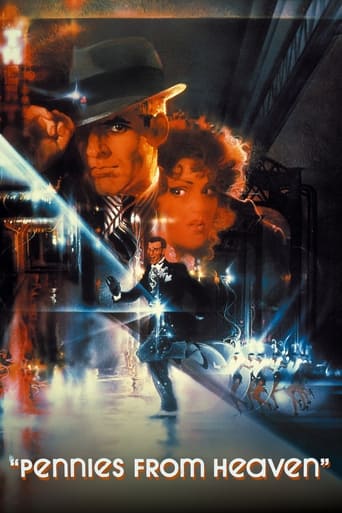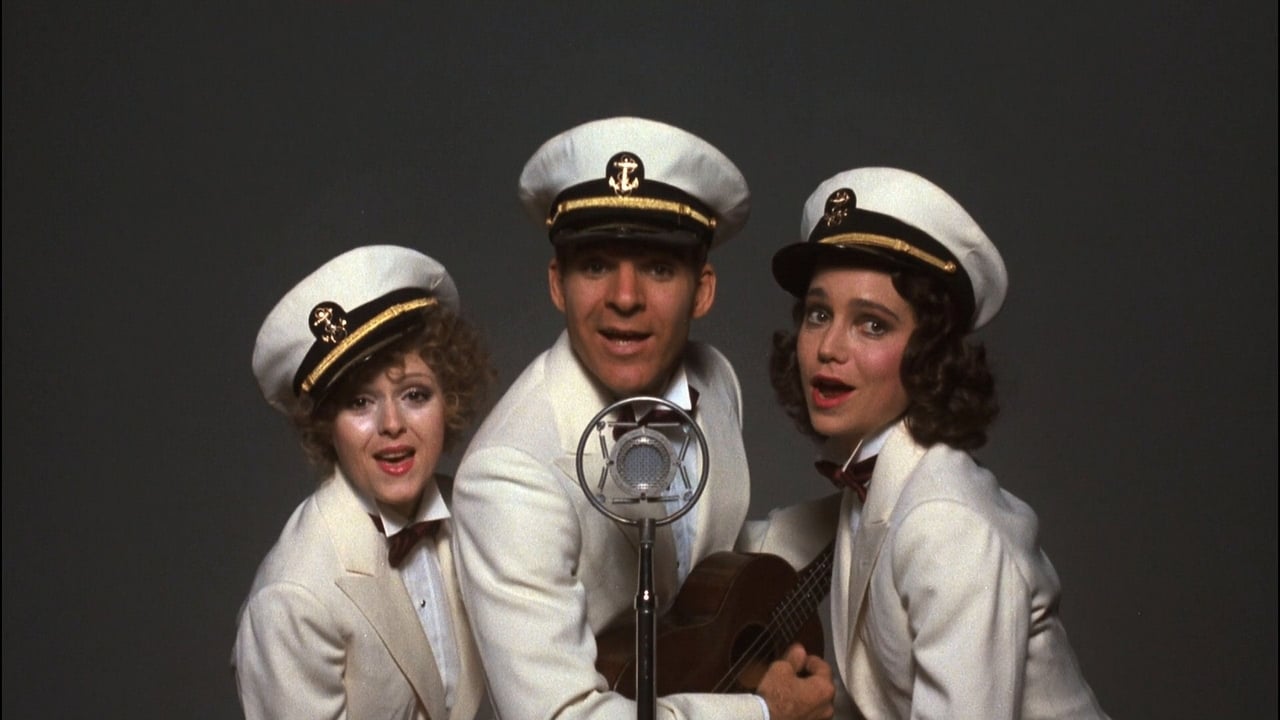mark.waltz
No, there's nothing jolly about the plot line of this version of the classic British TV series where the characters suddenly break into the original recordings of the 1930's, lip-syncing to the original performers. While there's a lot of the music missing from the T.V. series (particularly memorable to me was a scene where the women tap-dance on the hero's coffin in a fantasy sequence to "I'll Be Glad When You're Dead, You Rascal You!"), what remains is pure musical joy even though the plot is no laughing matter. Sheet music salesman Steve Martin is depressed over the state of affairs in his marriage (to the dour Jessica Harper) so he begins an affair with sweet school teacher Bernadette Peters. But evidence points to Martin being a murdering rapist while Peters faces disgrace as a result of the affair.Yes, the depression was depressing, and in addition to Bonnie and Clyde, bread lines and chants of "Brother, Can You Spare a Dime?", there was all that wonderful music, through the movies, Broadway and radio. After being turned down for a loan, Martin and the banker suddenly kiss (in Martin's fantasy) and break into "Yes, Yes, My Baby Said Yes Yes" (a song first performed in the Eddie Cantor musical "Palmy Days") while Bernadette quiets her kiddies down with "Love is Good For Anything That Ails You", also sung in "Hit Parade of 1937". Christopher Walken is a pimp who strips to "Let's Misbehave" and Vernal Bagneris shows humanity as the tramp who sings the title song. Broadway veteran John McMartin appears briefly as Peters' boss.Another amazing highlight is the fantasy sequence where Steve and Bernadette turn into Fred and Ginger while watching "Follow the Fleet" and take over "Let's Face the Music and Dance", filmed in black and white with the two wearing the exact same outfits that Fred and Ginger were wearing. It's a magical moment in post-classic era cinema that is rare to be sure. The songs don't really move the plot along (as they aren't meant to) but represent the element of hope Martin keeps hidden away as his life falls apart. The ending is a bit jarring and unbelievable, but was probably necessary to prevent a bad word of mouth from spreading. This would certainly be a project worth considering for Broadway, but then again, with all the other movies having been musicalized, you have to say, why bother?
Don Tyler
The idea for Pennies from Heaven came from a 1978 BBC television series of the same name. Dennis Potter, the writer for the British TV series, also wrote the screenplay for the film adaptation. The BBC drama-with- music starred Bob Hoskins as Arthur Parker, a cowardly and dishonest sheet-music salesman in Depression-era England. The film's setting was changed to Chicago but the time period was the same. The 1981 film attempts to spoof the musical movies of the Thirties, like those of Fred Astaire and Ginger Rogers and those directed and/or choreographed by Busby Berkeley. It was sceenwriter Dennis Potter's idea to contrast the beautiful illusions in the songs' lyrics with the ugly realities of the Depression. Herbert Ross' 1981 film has nothing in common with the 1936 Bing Crosby movie of the same title, except the time period and the title song, which Crosby introduced in the 1936 film. Except for a couple of songs, all of the musical numbers are lip-synced by the on-screen performers to authentic Thirties' recordings. Several of the songs from the film, including the title song, have copyright dates after 1934. Pennies from Heaven tried to be campy, but instead of being campy it came off as silly. The lip-syncing to recordings from the Thirties is difficult to justify, especially when a male lip-syncs to a female voice, and when, in some instances, Steve Martin and Bernadette Peters sing for themselves. The film was not particularly successful in its theatrical run, but was more successful on television and in its subsequent video release. By the early Eighties, Steve Martin was known primarily as the "wild and crazy guy" comedian, and this film was a departure from his earlier film, The Jerk. He was not known as a singer or dancer, although he had sung "Maxwell's Sledge Hammer" in the Beatles' Sgt. Pepper's Lonely Hearts Club Band. Martin reportedly practiced the tap dancing routines in the movie for six months prior to filming.
ackstasis
Christopher Walken dancing. Why this three-word pitch should compel me to look up 'Pennies from Heaven (1981),' I'm not sure, but there's no doubt that his mimed performance of "Let's Misbehave" is the film's show-stopper. Indeed, the film is full of surprises. Who, for example, could have gauged that not only is Steve Martin a competent dancer, but he's actually quite excellent? This musical, directed by Herbert Ross, was adapted by Dennis Potter from his own 1978 BBC miniseries, which I haven't yet seen. Set in Depression-era Chicago, this MGM production follows a sex-obsessed sheet music salesman who falls on hard financial times, relying on his music to remain optimistic in the face of injustice. It's an exceedingly grim tale, and the frothy musical numbers clash horribly with the murky narrative, but I nonetheless admire the filmmakers and the cast {Martin's previous starring role was in the goofball comedy 'The Jerk (1979)'} for taking part in such an audacious, offbeat project. In any case, the gamble didn't pay off, and 'Pennies from Heaven' flopped.Having seen a fair amount of 1930s musicals myself, I've come to understand how, in the midst of the Great Depression, it was endless optimism that ensured financial success. Audiences came to the cinema, not to be reminded of their financial woes, but to escape into a fantastic, glittering world of wealth and lighthearted romantic frivolity. To watch 'Top Hat (1935)' or 'Swing Time (1936),' for example, you'd never know that millions of Americans were out of work. As a counterpoint, the only vaguely-serious Astaire/Rogers musical, 'The Story of Vernon and Irene Castle (1939),' did poorly at the box-office. This is what 'Pennies from Heaven' is all about. Rather than being about how ordinary people use fantasy to escape from their daily anguish, Ross' film more specifically examines, both affectionately and critically, the vital role of art (encompassing both music and cinema) in maintaining one's hope and sanity, similar Woody Allen's 'The Purple Rose of Cairo (1985)' {both films notably utilised scenes from an Astaire/Rogers film}.What is the appeal of the Hollywood musical, anyway? Why must songs and dances be scattered regularly throughout the drama, and why would the film simply feel empty without them? The musical numbers are an emotional outlet for the film's characters, a voice-piece through which they can express feelings that they would otherwise be unable to put into words. Indeed, in this case, the songs are not even being sung by the actors themselves, but by Bing Crosby, Fred Astaire, Helen Kane and Irving Aaronson, musical performers who sing for an entire nation; they give voice to the emotions that the ordinary folk are experiencing. Every musical number in 'Pennies from Heaven' takes place in a setting somewhat displaced from reality, on the edge of the characters' tongues but never quite in the open. It's the sort of ineffectual daydream that gets nothing done, but if you can take refuge in this dreamworld, and acquire solace from a world otherwise devoid of comfort, then it's all right. If nothing else, our fantasies will always have a happy ending.
moonspinner55
Heavy-going, off-putting Depression-era musical (set to old recordings of the 1930s) is quite elaborate and usually looks good, but is filled with ciphers. Steve Martin, in a fair dramatic acting turn, plays a sex-obsessed sheet-music salesman in Chicago with no conscience who cheats on his frigid wife with a schoolteacher, later becoming involved in a murder investigation. Unfortunately for Martin, this character is such a crude, lascivious lout, we don't really care about his fate or whether or not his teacher-girlfriend (now a prostitute) leaves him. Jessica Harper (as the cold-fish wife) is every married man's nightmare: the bride-turned-shrew; Bernadette Peters is somewhat more sympathetic as the lover, and gets to utilize her natural Kewpie doll-ness to fantastic effect in the musical numbers. But, for the most part, "Pennies From Heaven" is peopled with low-lifes. The extravagant showstoppers, fantasy sequences designed like mini Busby Berkeley movies, are breathlessly intricate and exciting to watch, but they provide little emotional subtext for what's happening in the real world (I don't know if original creator Dennis Potter meant it or not, but the material plays like "Up the Sandbox" with music). Herbert Ross directed with a heavy hand, though he does get some fine moments from his cast, especially Christopher Walken as a hoofing pimp. An expensive remake of a British mini-series starring Bob Hoskins, the movie ultimately feels a bit claustrophobic and sluggish, and has an unsatisfying wrap-up to its reedy-thin plot. **1/2 from ****



 AD
AD




